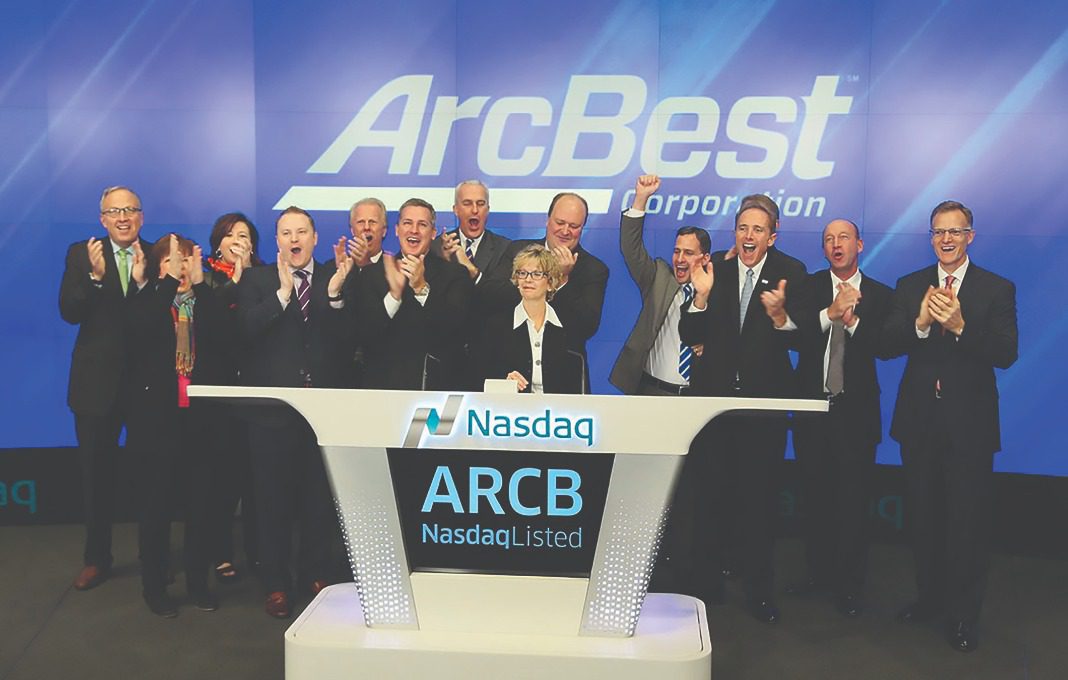Companies Of A Century: ArcBest Doubles Down On Deal-Making


Editor’s Note: Chief Executive is kicking off a new annual tradition this year by celebrating every sizable (over $100 million in annual revenues) standalone company turning 100 in 2023. Check out the rest of this year’s class for tips, insights and, above all else, the inspiration you need to keep going….and going.
HQ: Fort Smith, Arkansas
Revenues: $5.3 billion
Employees: 15,000+
The 100-year history of ArcBest is a veritable travelogue through the history of the freight transportation sector. An innovative company that began as a small, local freight hauler evolved via a remarkable series of acquisitions into one of the nation’s largest interstate motor carriers by the 1970s, only to narrowly escape a hostile takeover a decade later, then reemerge as a leading integrated provider of supply chain logistics globally.
ArcBest today is an amalgamation of truckload and less-than-truckload (LTL) freight companies, as well as a provider of household goods moving, transportation management services and logistics, repair and maintenance services and premium digital and other technology offerings. It’s a far cry from the company’s quiet beginnings as a small, local freight hauler in and around Fort Smith, Arkansas, named OK Transfer.
ArcBest’s historical records lack any details on the founder of OK Transfer, perhaps due to the delivery company’s minuscule size. The name didn’t last long anyway. When the company acquired Arkansas Motor Freight (AMF) in 1935, it assumed the name as well. The combined organization tallied 10 employees, three locations, two tractors, three trailers, one pickup truck and $50,000 in annual revenue.
Following the acquisition of another LTL freight company, Motor Express, AMF became an interstate regional carrier. Other acquisitions followed, most of them piloted by Robert A. Young, Jr., who acquired AMF in 1951. Upon his acquisition of Arkansas Best Freight (ABF) in 1956, the company’s name changed again. His son, Robert Young III, recalled in a history of ABF that his father was “a gambler, a risk taker,” who “hocked his life insurance policies” and assumed additional debt to buy AMF, feeling it had a bright future.
Having made over 20 acquisitions, all of them profitable within a year, Young formed Arkansas Best Corporation (ABC) in 1966 for his holdings, which included an IT business known today as ArcBest Technologies. In 1972, ABC became a public company listed on the NYSE. Additional acquisitions commenced, including Navajo Freight Lines, a large LTL making ABC the ninth-largest interstate carrier in the U.S.
When the stock market crashed on Oct. 19, 1987, the good news soured. ABC’s stock plunged from about $30 per share to $8. A $230 million all-cash bid to acquire the company was made in 1988 by a shareholder who had amassed a 10 percent stake. The bidder reportedly wanted ABC’s real estate, which included three parcels of land in Los Angeles valued much higher than the $230 million bid. To thwart the hostile takeover, Young held merger talks with a number of suitors, ultimately deciding to take the company private via a leveraged buyout. “If we had screwed up, we were dead,” he said.
Four years later, ABC was again a public company, trading on the Nasdaq. In the 21st century, under CEO Judy R. McReynolds, ABC doubled down on its portfolio of transportation solutions, forming ABF Logistics in 2013. The following year, the company was renamed ArcBest Corporation.
ArcBest was well positioned to assist companies during the supply chain debacle. “Our ArcBest Technologies team,” McReynolds recently said, “is… focused on developing transformative solutions that deliver value and drive our industry forward.”
Among the solutions is The Vaux OS software stack, which integrates with existing warehouse management systems to provide warehouse supervisors real-time insights into freight moves, enabling better decisions that improve dock utilization, reduce costs and impact sustainability. With 2022 revenues totaling a record $5.3 billion, up from $4 billion in 2021, McReynolds commented, “We see tremendous opportunities ahead.”
Not bad for a one-time local freight hauler.


0

1:00 - 5:00 pm
Over 70% of Executives Surveyed Agree: Many Strategic Planning Efforts Lack Systematic Approach Tips for Enhancing Your Strategic Planning Process
Executives expressed frustration with their current strategic planning process. Issues include:
Steve Rutan and Denise Harrison have put together an afternoon workshop that will provide the tools you need to address these concerns. They have worked with hundreds of executives to develop a systematic approach that will enable your team to make better decisions during strategic planning. Steve and Denise will walk you through exercises for prioritizing your lists and steps that will reset and reinvigorate your process. This will be a hands-on workshop that will enable you to think about your business as you use the tools that are being presented. If you are ready for a Strategic Planning tune-up, select this workshop in your registration form. The additional fee of $695 will be added to your total.

2:00 - 5:00 pm
Female leaders face the same issues all leaders do, but they often face additional challenges too. In this peer session, we will facilitate a discussion of best practices and how to overcome common barriers to help women leaders be more effective within and outside their organizations.
Limited space available.

10:30 - 5:00 pm
General’s Retreat at Hermitage Golf Course
Sponsored by UBS
General’s Retreat, built in 1986 with architect Gary Roger Baird, has been voted the “Best Golf Course in Nashville” and is a “must play” when visiting the Nashville, Tennessee area. With the beautiful setting along the Cumberland River, golfers of all capabilities will thoroughly enjoy the golf, scenery and hospitality.
The golf outing fee includes transportation to and from the hotel, greens/cart fees, use of practice facilities, and boxed lunch. The bus will leave the hotel at 10:30 am for a noon shotgun start and return to the hotel after the cocktail reception following the completion of the round.